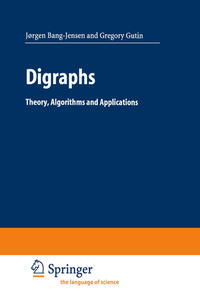
Graph theory is a very popular area of discrete mathematics with not only numerous theoretical developments, but also countless applications to prac tical problems. As a research area, graph theory is still relatively young, but it is maturing rapidly with many deep results having been discovered over the last couple of decades. The theory of graphs can be roughly partitioned into two branches: the areas of undirected graphs and directed graphs (digraphs). Even though both areas have numerous important applications, for various reasons, undirected graphs have been studied much more extensively than directed graphs. One of the reasons is that undirected graphs form in a sense a special class of directed graphs (symmetric digraphs) and hence problems that can be for mulated for both directed and undirected graphs are often easier for the latter. Another reason is that, unlike for the case of undirected graphs, for which there are several important books covering both classical and recent results, no previous book covers more than a small fraction of the results obtained on digraphs within the last 25 years. Typically, digraphs are consid ered only in one chapter or by a few elementary results scattered throughout the book. Despite all this, the theory of directed graphs has developed enormously within the last three decades. There is an extensive literature on digraphs (more than 3000 papers). Many of these papers contain, not only interesting theoretical results, but also important algorithms as well as applications.